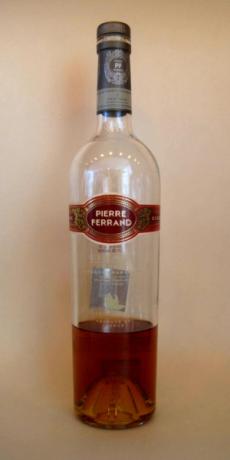
Cognac is a type of grape [ingredient=brandy brandy] made in and around the town of Cognac, north of Bordeaux in western France. Cognac is a protected name, having Appelation d'Origine Controlee status from the French government. While all Cognac is brandy, not all brandy is Cognac.
The history of the Cognac region started in the 16th century, with the arrival of Dutch merchants. They realized that the thin wine produced there did not hold up well to transportation, so they began distilling wine into brandy. The clear, raw spirit took on flavor and color from the barrels it was stored in, and over time, the brandies from this region became popular.
Cognac has had AOC status since 1909. Regulations state that in order to be called Cognac AOC, wine made from Ugni Blanc, Folle Blanche, or Colombard must be wild fermented without sulfur or additional sugar into wine, then double distilled in an alembic (also known as a pot) still. It then must be aged in oak barrels from the forests of Limousin and Tronçais. It must be in barrel for at least two years, but some Cognac can be aged in barrel for 40 or 50 years before the spirit reaches 80 proof naturally, and the wood stops changing the character of the spirit -- once this happens, Cognac is transferred into glass demijohns that do not influence flavor.
The Cognac region was devastated, along with the rest of France, by the epidemic of Phylloxera, a root louse native to the United States that eats the roots of grapevines and kills vineyards. Even today, there is no cure for this pest. The only solution is to plant grafted vines with French budwood on American, resistant rootstock. Pre-phylloxera, the most common grape in the Cognac region was Folle Blanche, but it was prone to disease and tightly clustered, which led to mildew and the loss of the harvest. Today, Ugni Blanc (aka Trebbiano from Italy) must make up 90% of the wine base.
There are six major regions of Cognac production, arranged in a ring around the town of Sezongac. They are, in order of quality: Grande Champagne, Petite Champagne, Borderies, Fins Bois, Bons Bois, and Bois Ordinaires. Cognacs that are at least 50% Grande Champagne and the remainder Petite Champagne can be called "Fine Champagne".
There are many words that can be used on a label to describe how much aging a particular Cognac has undergone. There are three important ones that are most common:
- VS (Very Special), where the youngest spirit in the blend is at least two years old,
- VSOP (Very Special Old and Pale), where the youngest spirit is four years old, and
- XO (eXtra Old), where the youngest spirit is six years old, though this is changing to ten years in 2016.
- Other terms like Napoleon, Hors d'Age, or Extra are less well defined.
While there are hundreds of producers of Cognac, the vast majority is made by only four companies: Courvoisier, Remy Martin, Martell, and Hennessy. Other producers include Pierre Ferrand, Gabriel & Andrieu, Delamain, Kelt and Otard.
Cognac is easily substitutable for other brandies in cocktails, though they are typically more delicate and more aromatic than brandies from Spain, South Africa, or the United States.
Some popular cocktails containing Cognac
- Dolly Varden — Cognac, Cherry Liqueur, Chocolate liqueur, Bitters, Brandied cherry
- Marseille, July 4th, 1895 — Byrrh, Demerara Rum, Gran Classico, Cherry Liqueur, Pelinkovac, Cognac, Bitters, Grenadine, Rose water, Lactart
- Viva Alberti — Sparkling white wine, Strega, Cognac, Orange bitters, Cappelletti Aperitivo, Lemon juice, Orange peel
- Cherchez Le Parc — Cognac, Dry vermouth, Herbal liqueur, Cassis, Suze, Absinthe, Lemon peel
- Liquid Gold — Champagne, Cognac, Bitters, White grape juice, Lemon juice
- Fernet & Jerry — Fernet Branca, Cognac, Tom & Jerry batter, Milk, Nutmeg
- Mode Pour les Jeunes — Cognac, Bitters, Simple syrup, Cinnamon, Pear
- Infinite Sunset — Cognac, Dry vermouth, Campari, Cassis, Crème de Violette, Rich simple syrup 2:1
- Railcar #91 — Cognac, Lemon juice, Honey syrup, Orange Foam
- Fillmore — Cognac, Manzanilla sherry, Fernet Branca, Absinthe, Cinnamon syrup, Lemon peel